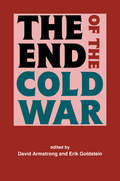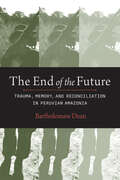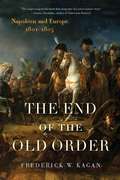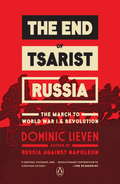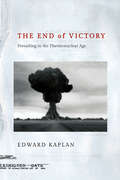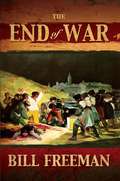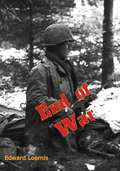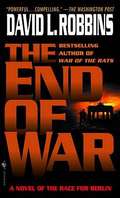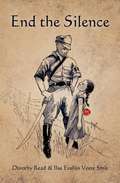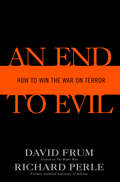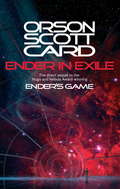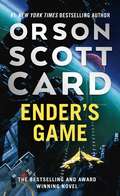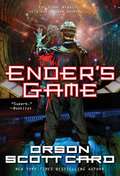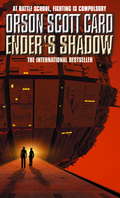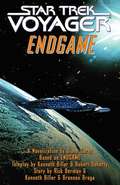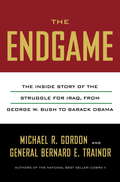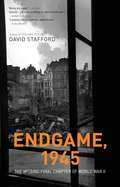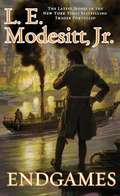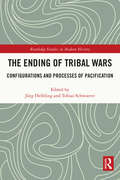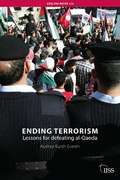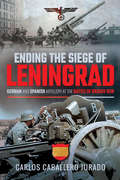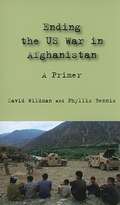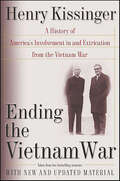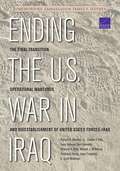- Table View
- List View
The End of the Cold War
by David Armstrong Erik GoldsteinGiving an overview of the origins and history of the Cold War, this work considers whether the Cold War is truly over, and what the effects have been on Europe, and the former Soviet Union, as well as US foreign policy.
The End of the Future: Trauma, Memory, and Reconciliation in Peruvian Amazonia
by Bartholomew DeanIn The End of the Future, author Bartholomew Dean broadens the theoretical framework for understanding memory's role in reconciliation following a violent conflict. This book explores the complicated and confusing linkages between memory and trauma for individuals caught up in civil war and post-conflict reconciliation in the Peruvian Amazon's Huallaga Valley—an epicenter for leftist rebels and a booming shadow economy based on the extraction and circulation of cocaine. The End of the Future tells the story of violent attempts by the Túpac Amaru Revolutionary Movement (Movimiento Revolucionario Túpac Amaru, MRTA) to overthrow the state in the late 1980s and early 1990s from the perspective of the poorest residents of the lower Huallaga's Caynarachi Basin. To give context to the causes and consequences of the MRTA's presence in the lower and central Huallaga, this book relies on the written works and testimony of Sístero García Torres, an MRTA rebel commander; the government's Truth and Reconciliation Commission; MRTA propaganda; media accounts; and critical historical texts. Besides exposing Huallaga Valley human rights abuses, the book's contribution to political anthropology is consequential for its insistence that reconciliation is by no means equivalent to local, Indigenous notions of "justice" or customary forms of dispute resolution. Without deliberately addressing the diverse socio-cultural contours defining overlapping epistemologies of justice, freedom, and communal well-being, enduring reconciliation will likely remain elusive.
End of the Game (Destroyer #60)
by Richard Sapir Warren MurphyWhen a California Video game programmer gets board he begins manipulating people's lives for fun. When his boardom, leads him into an attempt at neuclear war, Remo is sent in to provide entertainmet.
The End of the Old Order: Napoleon and Europe, 1801-1805
by Frederick KaganPerhaps no person in history has dominated his or her own era as much as Napoleon. Despite his small physical stature, the shadow of Napoleon is cast like a colossus, compelling all who would look at that epoch to chart their course by reference to him. For this reason, most historical accounts of the Napoleonic era-and there are many-tell the same Napoleon-dominated story over and over again, or focus narrowly on special aspects of it. Frederick Kagan, distinguished historian and military policy expert, has tapped hitherto unused archival materials from Austria, Prussia, France, and Russia, to present the history of these years from the balanced perspective of all of the major players of Europe. InThe End of the Old Orderreaders encounter the rulers, ministers, citizens, and subjects of Europe in all of their political and military activity-from the desk of the prime minister to the pen of the ambassador, from the map of the general to the rifle of the soldier. With clear and lively prose, Kagan guides the reader deftly through the intriguing and complex web of international politics and war. The End of the Old Orderis the first volume in a new and comprehensive four-volume study of Napoleon and Europe. Each volume in the series will surprise readers with a dramatically different tapestry of early nineteenth-century personalities and events and will revise fundamentally our ages-old understanding of the wars that created modern Europe.
The End of Tsarist Russia: The March to World War I and Revolution
by Dominic LievenAn Economist Best Book of the YearA Financial Times Best Book of the YearWinner of the the Pushkin House Russian Book PrizeFinalist for the Lionel Gelber PrizeAn Amazon Best Book of the Month (History)One of the world's leading scholars offers a fresh interpretation of the linked origins of World War I and the Russian Revolution"Lieven has a double gift: first, for harvesting details to convey the essence of an era and, second, for finding new, startling, and clarifying elements in familiar stories. This is history with a heartbeat, and it could not be more engrossing."--Foreign AffairsWorld War I and the Russian Revolution together shaped the twentieth century in profound ways. In The End of Tsarist Russia, acclaimed scholar Dominic Lieven connects for the first time the two events, providing both a history of the First World War's origins from a Russian perspective and an international history of why the revolution happened. Based on exhaustive work in seven Russian archives as well as many non-Russian sources, Dominic Lieven's work is about far more than just Russia. By placing the crisis of empire at its core, Lieven links World War I to the sweep of twentieth-century global history. He shows how contemporary hot issues such as the struggle for Ukraine were already crucial elements in the run-up to 1914. By incorporating into his book new approaches and comparisons, Lieven tells the story of war and revolution in a way that is truly original and thought-provoking.From the Hardcover edition.
The End of Victory: Prevailing in the Thermonuclear Age
by Edward KaplanThe End of Victory recounts the costs of failure in nuclear war through the work of the most secret deliberative body of the National Security Council, the Net Evaluation Subcommittee (NESC). From 1953 onward, US leaders wanted to know as precisely as possible what would happen if they failed in a nuclear war—how many Americans would die and how much of the country would remain. The NESC told Presidents Dwight Eisenhower and John F. Kennedy what would be the result of the worst failure of American strategy—a maximum-effort surprise Soviet nuclear assault on the United States. Edward Kaplan details how NESC studies provided key information for presidential decisions on the objectives of a war with the USSR and on the size and shape of the US military. The subcommittee delivered its annual reports in a decade marked by crises in Berlin, Quemoy and Matsu, Laos, and Cuba, among others. During these critical moments and day-to-day containment of the USSR, the NESC's reports offered the best estimates of the butcher's bill of conflict and of how to reduce the cost in American lives.Taken with the intelligence community's assessment of the probability of a surprise attack, the NESC's work framed the risks of US strategy in the chilliest years of the Cold War. The End of Victory reveals how all policy decisions run risks—and ones involving military force run grave ones—though they can rarely be known with precision.
The End of War
by Bill FreemanThe End of War is a study of war and the possibility of peace. In the past empires used war and the threat of war as a way to dominate and exploit others, but in the modern world that is no longer possible. A new multi-lateral world is emerging where all nations will be required to ensure peace. Wars are diminishing but it will require a major effort if we are to go the final step to bring an end to the violence.
End of War
by Edward LoomisHe came from Ohio. Young, unsure of himself, innocent. He came to Europe as an infantryman battling his way into the heart of Germany.There he stopped being unsure of himself. He stopped when he first went into battle and heard the singing of bullets close overhead, heard the crump of the four-inch mortars and saw the Tiger tanks rumbling towards him.He grew to maturity when he killed his first German and he stopped being innocent when he bought his first woman...for a bar of chocolate.When the war ended and the fighting died away, how was he to regain his lost innocence? How was he to lose the habits of a killer?There was no one to help him except Chrystel, the refugee with the body of a girl and the heart of a woman. No one but Chrystel...and himself.
The End of War: A Novel of the Race for Berlin
by David L. RobbinsIn the final months of the Second World War, one strategic question above all occupies the Allies: which liberating army will be the first to march into Berlin? On the western front, Montgomery lobbies for the honour, while Eisenhower becomes more and more determined to thwart him and put an American general -- Bradley or Patton -- in charge of the final thrust; in the east, Stalin's armies advance steadily and ruthlessly towards the apotheosis of their vengeance.
End the Silence
by Dorothy Read Ilse Evelijn Veere SmitEnd the Silence tells the story of Ilse, an Indo-European born into an idyllic childhood in the colonial society of the Dutch East Indies. Ilse's privileged life was forever changed when the Japanese invaded her homeland during World War II. She recounts her years of internment in a Japanese concentration camp on Java. Then, at the war's end she walked out of Camp Halmaheira only to walk into the bloody Indonesian revolution where she was targeted for execution by native freedom fighters. Finally, she tells of the pain she suffered trying to cope with her memories in a family that refused to talk about it. As Ilse recalls the scenes in her remarkable journey, Dorothy Read paints them in the words of both the young Ilse who lived them and today's Ilse who reflects upon them.
An End to Evil
by David Frum Richard PerleAn End to Evil charts the agenda for what's next in the war on terrorism, as articulated by David Frum, former presidential speechwriter and bestselling author of The Right Man, and Richard Perle, former assistant secretary of defense and one of the most influential foreign-policy leaders in Washington. This world is an unsafe place for Americans--and the U.S. government remains unready to defend its people. In An End to Evil, David Frum and Richard Perle sound the alert about the dangers around us: the continuing threat from terrorism, the crisis with North Korea, the aggressive ambitions of China. Frum and Perle provide a detailed, candid account of America's vulnerabilities: a military whose leaders resist change, intelligence agencies mired in bureaucracy, diplomats who put friendly relations with their foreign colleagues ahead of the nation's interests. Perle and Frum lay out a bold program to defend America--and to win the war on terror. Among the topics this book addresses: * why the United States risks its security if it submits to the authority of the United Nations * why France and Saudi Arabia have to be treated as adversaries, not allies, in the war on terror * why the United States must take decisive action against Iran--now* what to do in North Korea if negotiations fail* why everything you read in the newspapers about the Israeli-Arab dispute is wrong * how our government must be changed if we are to fight the war on terror to victory--not just stalemate * where the next great terror threat is coming from--and what we can do to protect ourselves An End to Evil will define the conservative point of view on foreign policy for a new generation--and shape the agenda for the 2004 presidential-election year and beyond. With a keen insiders' perspective on how our leaders are confronting--or not confronting--the war on terrorism, David Frum and Richard Perle make a convincing argument for why the toughest line is the safest line.From the Hardcover edition.
Ender In Exile: Book 5 of the Ender Saga (Ender Saga #5)
by Orson Scott Card'The novels of Orson Scott Card's Ender series are an intriguing combination of action, military and political strategy, elaborate war games and psychology.' - USA TODAY'Hugo and Nebula-award winner Orson Scott Card demonstrates again that he belongs in the company of such older masters of science fiction as Isaac Asimov, Frank Herbert and Ursula K. Le Guin.' - Magill Book ReviewsAt first, Ender believed that they would bring him back to Earth as soon as things quieted down. But things were quiet now, had been quiet for a year, and it was plain to him now that they would not bring him back at all, that he was much more useful as a name and a story than he would ever be as an inconveniently flesh-and-blood person.At the close of ENDER'S GAME, Andrew Wiggin - called Ender by everyone - knows that he cannot live on Earth. He has become far more than just a boy who won a game: he is the Saviour of Earth, a hero, a military genius whose allegiance is sought by every nation of the newly shattered Earth Hegemony.He is offered the choice of living under the Hegemon's control, a pawn in his brother Peter's political games. Or he can join the colony ships and go out to settle one of the new worlds won in the war. The story of those years on the colony worlds has never been told . . . until now.The direct sequel to the Hugo and Nebula Award-winning bestseller, ENDER'S GAME.Books by Orson Scott Card:Alvin Maker novelsSeventh SonRed ProphetPrentice AlvinAlvin JourneymanHeartfireThe Crystal CityEnder Wiggin SagaEnder's GameSpeaker for the DeadXenocideChildren of the MindEnder in ExileHomecomingThe Memory of the EarthThe Call of the EarthThe Ships of the EarthEarthfallEarthbornFirst Formic War (with Aaron Johnston)Earth UnawareEarth AfireEarth Awakens
Ender's Game: Response Journal (The Ender Quintet #1)
by Orson Scott CardWinner of the Hugo and Nebula AwardsIn order to develop a secure defense against a hostile alien race's next attack, government agencies breed child geniuses and train them as soldiers. A brilliant young boy, Andrew "Ender" Wiggin lives with his kind but distant parents, his sadistic brother Peter, and the person he loves more than anyone else, his sister Valentine. Peter and Valentine were candidates for the soldier-training program but didn't make the cut—young Ender is the Wiggin drafted to the orbiting Battle School for rigorous military training.Ender's skills make him a leader in school and respected in the Battle Room, where children play at mock battles in zero gravity. Yet growing up in an artificial community of young soldiers Ender suffers greatly from isolation, rivalry from his peers, pressure from the adult teachers, and an unsettling fear of the alien invaders. His psychological battles include loneliness, fear that he is becoming like the cruel brother he remembers, and fanning the flames of devotion to his beloved sister. Is Ender the general Earth needs? But Ender is not the only result of the genetic experiments. The war with the Buggers has been raging for a hundred years, and the quest for the perfect general has been underway for almost as long. Ender's two older siblings are every bit as unusual as he is, but in very different ways. Between the three of them lie the abilities to remake a world. If, that is, the world survives.Ender's Game is the winner of the 1985 Nebula Award for Best Novel and the 1986 Hugo Award for Best Novel.At the Publisher's request, this title is being sold without Digital Rights Management Software (DRM) applied.
Ender's Game (Ender's Game #1)
by Orson Scott CardIn order to develop a secure defense against a hostile alien race's next attack, government agencies breed child geniuses and train them as soldiers. A brilliant young boy, Andrew "Ender" Wiggin lives with his kind but distant parents, his sadistic brother Peter, and the person he loves more than anyone else, his sister Valentine. Peter and Valentine were candidates for the soldier-training program but didn't make the cut — young Ender is the Wiggin drafted to the orbiting Battle School for rigorous military training.<P><P> Ender's skills make him a leader in school and respected in the Battle Room, where children play at mock battles in zero gravity. Yet growing up in an artificial community of young soldiers Ender suffers greatly from isolation, rivalry from his peers, pressure from the adult teachers, and an unsettling fear of the alien invaders. His psychological battles include loneliness, fear that he is becoming like the cruel brother he remembers, and fanning the flames of devotion to his beloved sister.<P> Is Ender the general Earth needs? But Ender is not the only result of the genetic experiments. The war with the Buggers has been raging for a hundred years, and the quest for the perfect general has been underway for almost as long. Ender's two older siblings are every bit as unusual as he is, but in very different ways. Between the three of them lie the abilities to remake a world. If, that is, the world survives.<P> Hugo and Nebula Awards Winner.
Ender's Shadow: Book 1 of The Shadow Saga (Shadow Saga #1)
by Orson Scott Card'The emotional punch is still as powerful as ever. Excellent.' - SFX'Haunting, compulsive, urgently readable...Story-telling genius.' - InterzoneOrson Scott Card is one of the world's bestselling SF authors, and the award-winning Ender saga is one of the best-loved series in the genre. ENDER'S SHADOW is the first volume in a new Ender series. Returning to the time of Ender's Game, ENDER'S SHADOW follows the incredible story of one of Ender Wiggin's fellow pupils at Battle School. Compelling, compulsive reading, ENDER'S SHADOW is certain to thrill all fans of the original series and attract many new readers.The first book in a new Ender series by bestselling author Orson Scott Card.Books by Orson Scott Card:Alvin Maker novelsSeventh SonRed ProphetPrentice AlvinAlvin JourneymanHeartfireThe Crystal CityEnder Wiggin SagaEnder's GameSpeaker for the DeadXenocideChildren of the MindEnder in ExileHomecomingThe Memory of the EarthThe Call of the EarthThe Ships of the EarthEarthfallEarthbornFirst Formic War (with Aaron Johnston)Earth UnawareEarth AfireEarth Awakens
Endgame (Star Trek: Voyager)
by Diane Carey Christie GoldenFor seven tumultuous years, the U.S.S. Voyager has explored the Delta Quadrant, encountering strange alien civilizations and bizarre space-time anomalies as it steadfastly made its way back toward the safety of Federation space. Captain Kathryn Janeway and her heroic crew have faced all manner of harrowing danger and hostile life-forms -- including the Kazons, the Borg, and the Q -- while never losing sight of their ultimate goal: home. Now, at last, Voyager's epic trek may be nearing its end... After so many perilous and astounding adventures, will Captain Janeway finally bring her wayward starship back to the Alpha Quadrant? And what will become of her diverse yet tightly knit crew? Will Chakotay, B'Elanna Torres, and the other former Maquis freedom fighters face long-delayed justice for their crimes against the Federation? And is there any place in Starfleet for the uniquely independent Borg known as Seven of Nine? As the ultimate destiny of Voyager is revealed, all that is certain is that nothing will ever be the same!
The Endgame
by Michael R. Gordon Bernard E. TrainorEagerly anticipated in the wake of their national best seller Cobra II ("The superb, must-read military history of the invasion of Iraq"--Thomas L. Friedman), The Endgame is Michael R. Gordon and General Bernard E. Trainor's most ambitious and news-breaking book to date. A peerless work of investigative journalism and historical recreation ranging from 2003 to 2012, it gives us the first comprehensive, inside account of arguably the most widely reported yet least understood war in American history--from the occupation of Iraq to the withdrawal of American troops. Prodigiously researched, The Endgame is not only based on an abundance of highly classified, still-secret government documents but is also brilliantly informed by access to key figures in the White House, the military, the State and Defense departments, the intelligence community, and, most strikingly, by extensive interviews with both Sunni and Shiite leaders, key Kurdish politicians, tribal sheikhs, former insurgents, Sadrists, and senior Iraqi military officers, whose insights about critical turning points and previously unknown decisions made during the war have heretofore been conspicuously missing from the media's coverage of it. The Endgame is riveting as a blow-by-blow chronicle of the fighting. It is also relentlessly revealing, as it deftly pieces together the puzzle of the prosecution of American, Iraqi, and Iranian objectives, and the diplomatic intrigue and political struggle within Iraq since the American invasion.
Endgame, 1945: The Missing Final Chapter of World War II
by David Stafford"War is too important to be left to the generals," Georges Clemenceau once famously remarked. Stafford (Centre for the Study of the Two World Wars, U. of Edinburgh, UK) adds, "the history of war is too important to be left to the military historians alone," especially as they tend to end their accounts with the immediate cessation of hostilities and neglect the importance of war's aftermath. His method of capturing some of the realities of the final days and immediate aftermath, through mid-summer 1945, of World War II, is to weave together the biographies of "a handful of individuals," including a German mother separated from her sons and imprisoned by the Nazis, a British commando witness to the aftermath of the horrors of the concentration camps, an American soldier in Italy, a war correspondent traveling with Gen. Patton's forces into Germany, a Canadian officer in Holland, a German-Jewish exile serving as a British secret agent in Austria, a New Zealand intelligence officer working in opposition to the communists in the disputed city of Trieste, an American paratrooper in Berlin involved in some the very first manifestations of the Cold War confrontation with the Soviets, and a woman involved with humanitarian work for concentration camp victims. Annotation ©2008 Book News, Inc., Portland, OR (booknews.com)
Endgames (The Imager Portfolio #12)
by L. E. Modesitt Jr.Endgames is the stunning final volume in L. E. Modesitt, Jr's, New York Times bestselling epic fantasy series the Imager Portfolio, and the third book in the story arc that began with Madness in Solidar through Treachery's Tools and Assassin's Price.Solidar is in chaos.Charyn, the young and untested ruler of Solidar, has survived assassination, and he struggles to gain control of a realm in the grip of social upheaval, war, and rioting. Solidar cannot be allowed to slide into social and political turmoil that will leave the High Holders with their ancient power and privilege, and the common people with nothing.But the stakes are even higher than he realizes. <P><P>The Imager Portfolio #1 Imager / #2 Imager’s Challenge / #3 Imager’s Intrigue / #4 Scholar / #5 Princeps / #6 Imager’s Battalion / #7 Antiagon Fire / #8 Rex Regis / #9 Madness in Solidar / #10 Treachery’s Tools / #11 Assassin’s Price / #12 Endgames <P><P> Other series by L. E. Modesitt, Jr. The Saga of RecluceThe Corean ChroniclesThe Spellsong CycleThe Ghost BooksThe Ecolitan Matter <P><P>At the Publisher's request, this title is being sold without Digital Rights Management Software (DRM) applied.
The Ending of Tribal Wars: Configurations and Processes of Pacification (Routledge Studies in Modern History #79)
by Jürg Helbling Tobias SchwoererAll over the world and throughout millennia, states have attempted to subjugate, control and dominate non-state populations and to end their wars. This book compares such processes of pacification leading to the end of tribal warfare in seven societies from all over the world between the 19th and 21st centuries. It shows that pacification cannot be understood solely as a unilateral imposition of state control but needs to be approached as the result of specific interactions between state actors and non-state local groups. Indigenous groups usually had options in deciding between accepting and resisting state control. State actors often had to make concessions or form alliances with indigenous groups in order to pursue their goals. Incentives given to local groups sometimes played a more important role in ending warfare than repression. In this way, indigenous groups, in interaction with state actors, strongly shaped the character of the process of pacification. This volume’s comparison finds that pacification is more successful and more durable where state actors mainly focus on selective incentives for local groups to renounce warfare, offer protection, and only as a last resort use moderate repression, combined with the quick establishment of effective institutions for peaceful conflict settlement.
Ending Terrorism: Lessons for defeating al-Qaeda (Adelphi series)
by Audrey Kurth CroninLike all other terrorist movements, al-Qaeda will end. While it has traits that exploit and reflect the current international context, it is not utterly without precedent: some aspects of al-Qaeda are unusual, but many are not. Terrorist groups end according to recognisable patterns that have persisted for centuries, and they reflect, among other factors, the counter-terrorist policies taken against them. It makes sense to formulate those policies with a specific image of an end in mind. Understanding how terrorism ends is the best way to avoid being manipulated by the tactic. There is vast historical experience with the decline and ending of terrorist campaigns, yet few policymakers are familiar with it. This paper first explains five typical strategies of terrorism and why Western thinkers fail to grasp them. It then describes historical patterns in ending terrorism to suggest how insights from that history can lay a foundation for more effective counter-strategies. Finally, it extracts policy prescriptions specifically relevant to ending the campaign of al-Qaeda and its associates, moving towards a post-al-Qaeda world.
Ending the Siege of Leningrad: German and Spanish Artillery at the Battle of Krasny Bor
by Carlos Caballero JuradoThis vivid combat history examines the role of German and Spanish artillery in the WW2 fight for control of Leningrad.When Nazi Germany invaded the Soviet Union in 1941, it quickly established a blockade around Leningrad that would become one of the longest and most destructive in history. In an attempt to break the blockade in 1943, the Red Army launched an offensive near the town of Krasny Bor. Previous works on the Battle of Krasny Bor have focused on the infantry involved, while little attention has been paid to the use of German and Spanish artillery in the conflict. In Ending the Siege of Leningrad, Spanish military historian Carlos Caballero Jurado corrects this oversight. Describing the action from an artilleryman’s point of view, Jurado puts the reader in the heart of the battle.
Ending the US War in Afghanistan: A Primer
by David Wildman Phyllis BennisThe Bush Administration answered the terror attacks of September 11, 2001 with what it called the "global war on terror," first with the assault on Afghanistan and then the invasion of Iraq. More and more Americans joined the opposition to the Iraq war, but for many, Afghanistan remained "the good war." But was the war on Afghanistan ever a "good war?" And will President Obama's planned escalation of US troop presence in Afghanistan work? In this easy-to-read volume of "frequently asked questions," analysts David Wildman and Phyllis Bennis examine a wide range of key issues regarding the US war in Afghanistan.
Ending the Vietnam War: A History of America's Involvement in and Extrication from the Vietnam War
by Henry KissingerNow, for the first time, Kissinger gives us in a single volume an in-depth, inside view of the Vietnam War, personally collected, annotated, revised, and updated from his bestselling memoirs and his book Diplomacy.Many other authors have written about what they thought happened—or thought should have happened—in Vietnam, but it was Henry Kissinger who was there at the epicenter, involved in every decision from the long, frustrating negotiations with the North Vietnamese delegation to America's eventual extrication from the war.Here, Kissinger writes with firm, precise knowledge, supported by meticulous documentation that includes his own memoranda to and replies from President Nixon. He tells about the tragedy of Cambodia, the collateral negotiations with the Soviet Union and the People's Republic of China, the disagreements within the Nixon and Ford administrations, the details of all negotiations in which he was involved, the domestic unrest and protest in the States, and the day-to-day military to diplomatic realities of the war as it reached the White House.As compelling and exciting as Barbara Tuchman's The Guns of August, Ending the Vietnam War also reveals insights about the bigger-than-life personalities—Johnson, Nixon, de Gaulle, Ho Chi Minh, Brezhnev—who were caught up in a war that forever changed international relations. This is history on a grand scale, and a book of overwhelming importance to the public record.
Ending The U.s. War In Iraq
by Richard R. Brennan Charles P. Ries Larry Hanauer Ben Connable Terrence K. KellyEnding the U. S. war in Iraq required redeploying 100,000 military and civilian personnel; handing off responsibility for 431 activities to the Iraqi government, U. S. embassy, USCENTCOM, or other U. S. government entities; and moving or transferring ownership of over a million pieces of property in accordance with U. S. and Iraqi laws, national policy, and DoD requirements. This book examines the planning and execution of this transition.
